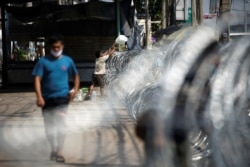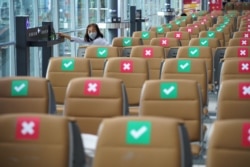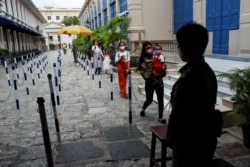It's holiday season in Thailand, when international tourists who pay top prices join local residents for countdowns, fireworks and a blur of partying.
Central World, a mall in downtown Bangkok famous for its annual mega countdown, displays the tallest Christmas tree in Southeast Asia and gigantic gift boxes. Icon Siam, a rival luxury mall on the Chao Praya River, plans to light up Bangkok's sky with a ribbon of fireworks just shy of a mile long.
But the weekend surge of hundreds of COVID-19 cases among migrant workers from Myanmar — Thailand's worst outbreak — is prompting authorities to rethink how to welcome 2021.
Samut Sakhon province, site of the current surge, is about 50 kilometers from Bangkok's sprawl and already locked down. Some large gatherings and New Year's events in Samut Sakhon and Bangkok were canceled in response. Those officially approved to proceed must impose stringent hygiene measures and prioritize social distancing.
"I'll spend the next seven days to assess the situation and then we will decide about public New Year celebrations," Thai prime minister Prayuth Chan-ocha told reporters Monday. "I urge you all not to panic. I hope the situation will get better in seven days."
The latest outbreak erupted just as the Thai tourism industry was seeing glimmers of relief after months without the foreign tourists who pump millions of dollars into the Thai economy.
While Thailand has largely contained the coronavirus — hovering near 5,300 infections and 60 deaths since January, according to Thailand's disease control department — the country's strict measures have battered its economy, especially the tourism sector.
"We miss (foreign tourists) greatly," said Ian Pirodon, general manager of The Continent Hotel in central Bangkok, where 95% of its pre-pandemic bookings were from foreign travelers.
'A very painful process'
Thailand was ranked the world's ninth most-visited country last year, according to the United Nations, welcoming 39.8 million foreign visitors. The capital, Bangkok, was named the world's most visited city for four consecutive years from 2016 to 2019 by Mastercard.
Tourism accounts for nearly 15% of Thailand's $543.55 billion gross domestic product, according to the World Bank. But by introducing tight entry restrictions and two-week quarantines to keep the pandemic at bay, the country saw a 79.46% drop in foreign visitors between January and October from 32.6 million to 6.7 million, while tourism spending plunged 71% from $40.3 billion to $11.05 billion, according to the Ministry of Tourism and Sports.
By the end of this year, Thailand's tourism authority estimates only 8 million visitors will have visited, a fifth of the 41.8 million expected before the coronavirus outbreak. That number would have included Michael Agard, who has celebrated New Year's with his American and Swedish relatives in southern Thailand for the past 15 years.
"I'd certainly like to get a vaccine before I go anywhere," said Agard, 42, an IT specialist from New York City, who got stuck in Fukuoka, Japan — his regular stopover on the haul back to New York — in February and has been working from there since. "I'm worried a bit about taking a risk of flying in a long-haul flight."
Many hotels have been closed for months. Those that are reopening are struggling to fill rooms by attracting Thais, who in a typical year account for a third of the total market.
"It's a huge challenge for the company," said Marion Walsh-Hédouin, the vice president of public relations and communications at Minor Hotels, an international hospitality group based in Bangkok. "We went through a very painful process of closing the hotels, of sadly losing many, many good team members across corporate offices and hotels. And we went through quite stringent right-sizing of the company."
Minor Hotels operates more than 530 hotels in 55 countries. In the first nine months of this year, the company reported a 63% decline in revenue from Thailand's hotels and spas compared to the same period last year. Its profit has swung to a loss of 1.9 billion baht, or $63.8 million.
Slow border reopening
In October, the Thai government eased its border restrictions to allow entry to foreigners from low-risk countries. Authorities began issuing a special tourist visa that required long-term stays, in part to accommodate the required quarantine period.
The program is falling short of expectations, with only 825 people and six luxury yachts from 29 countries taking advantage of the special visa, prompting the government this month to open the long-term stay option to all tourists regardless of their countries' COVID-19 situation. It also introduced a new measure that allows citizens from 56 countries, including the United States, to enter without a visa if they are willing to undergo a mandatory 14-day quarantine.
The quarantine is discouraging Colin Anderson, a 52-year-old Briton who for the last 25 years has traveled to Thailand in December from his home in Rotterdam, The Netherlands, to visit his brothers who live in Bangkok.
"I was pretty much prepared to pay money and do the 14-day quarantine, but eventually I realized it's 14 days in a room, eating takeaway food," said Anderson, who works in IT for an insurance company. "In the end, I decided it's just too much. I think if I was going for three to four months, I would definitely do it, but not for five or six weeks of vacation."
The quarantine also deterred Anderson's friend, Krijn Tol, who teaches English at a Rotterdam high school in The Netherlands.
"You have to stay in quarantine in a hotel, and it's a lot of money. It can add up to about $2,000, and that doesn't sound very inviting," said Tol, 65, who has an annual three-week winter break.
"I think most people don't want to go through that process of coming here. It's quite stringent," Walsh-Hedouin told VOA.
Hotel operators and associations have been pleading with the government to shorten the quarantine, relax border controls, and explore alternatives for safe entry, such as having "travel bubbles" with select countries that would permit entry without quarantine.
Thai officials said they are taking those suggestions seriously. This month, the government added a golf quarantine program, where golfers from overseas can stay in a resort and play rounds in a controlled quarantine environment, but it has yet to take other steps.
"We understand and feel the pain of the tourism operators, but we also have to listen to general populations who may have a different take on this issue," deputy government spokesperson Rachada Dhnadirek told VOA.
"It's our job to communicate and build understanding with all parties, but rest assured that we are constantly reviewing options that will help us contain the virus and support the economy," she said.
Officials said the quarantine period gives the public confidence. Cutting it short may be scientifically sufficient but psychologically fraught. Until recently, most cases in Thailand arrived with overseas visitors. In July, two foreigners infected with COVID-19 sparked nationwide fury by flouting COVID-19 containment protocols.
A member of a visiting Egyptian military team who tested positive for COVID-19 went to shopping malls with colleagues in Rayong province, 180 kilometers east of Bangkok, during a brief stay. The other person, the daughter of a Sudanese diplomat, tested negative upon arriving, then, after testing positive stayed in a Bangkok condominium rather than an official state quarantine site.
Pushing domestic tourism
To bolster the hospitality sector, the Thai government launched massive campaigns to stimulate domestic travels, by subsidizing 40% of hotel room rates and air tickets for Thai nationals and adding extra public holidays in November and December.
These campaigns and rising domestic consumption have enabled hospitality operators and hoteliers to reopen.
The Continent, a 154-room boutique hotel, reopened in October after six months.
Although hotels are getting a boost from the government's campaigns, a room with the discounted price of just more than 2,000 baht ($70) a night is a hard sell. The average Thai family earns $866 a month and spends $690, or 80%, on household expenditures, according to Thailand's National Statistical Office.
"Some 40 to 70 rooms a day and up to 80 to 90 rooms on a weekend are supported by Thai residents at 30 to 40% of what the rates used to be," Pirodon, the hotel's general manager, told VOA.
The Continent Hotel charges between 4,200 baht ($140) and 7,000 baht ($233) a night for its rooms. In 2019, the average room rates for Bangkok's five-star hotels and four-star hotels were about 9,000 baht ($300) and 4,500 baht ($150) a night respectively, according to a market survey by Edmund Tie, a Singapore-based real estate consulting firm.
"You're having to offer a rate, whether you are a four-star or a five-star hotel, in a 1,000 baht to 2,000 baht range ($33 to $66)" because that's what the domestic market can pay, according to Pirodon.
Until accurate, rapid testing and vaccines allow people to travel safely again, Pirodon said he is bracing for a slow recovery ahead.
"It's going to be a big struggle," he said.








